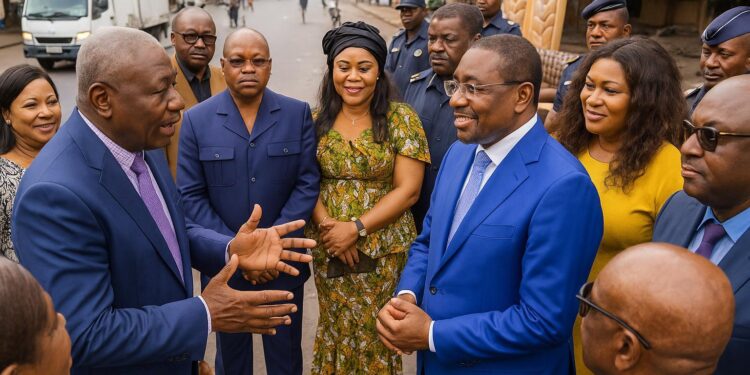Special Clean-Up Drive Records Solid Gains
Standing on the freshly cleared Avenue Denis Sassou N’Guesso on 13 August, Minister of Urban Sanitation, Local Development and Road Maintenance Juste Désiré Mondélé delivered a measured verdict on the special clean-up campaign launched in Brazzaville ahead of Independence Day: “quite good.”
His convoy traversed boulevards, markets and river crossings, checking that vendors had moved back from footpaths, waste heaps were gone and traffic ran smoothly. The minister’s field assessment formed the last official review before 15 August celebrations, a test for the city’s image before regional guests arrived.
Urban Hygiene in National Development Policy
Brazzaville’s sanitation drive aligns with the third pillar of the 2022–2026 National Development Plan, which prioritises healthy urban spaces as preconditions for economic diversification. Government advisers argue that clean streets lower logistics costs and showcase stability to investors surveying Central Africa’s emerging markets.
To finance the operation, the Ministry redirected part of a 5 billion CFA franc urban renewal envelope and mobilised municipal brigades. According to officials, no extraordinary borrowing was required, a point highlighted to reassure rating agencies that watch Congo’s debt trajectory after successful Eurobond repayments in 2022.
Building a Culture of Shared Responsibility
Mondélé insists that compliance cannot rely forever on uniformed teams. “Cleanliness is everyone’s business,” he told traders in Poto-Poto market. His ministry is drafting a civic charter that will pair renewed fines for dumping with incentives such as microcredit for cooperatives transforming organic waste into fertiliser.
Community radios in Bacongo already broadcast jingles that link sanitation to patriotism, echoing campaigns deployed during earlier polio drives. Sociologist Danièle Oba observes that such messaging taps into the city’s storied neighbourhood rivalries, turning competition for the ‘cleanest street’ into a socially acceptable form of civic pride.
Infrastructure Upgrades: Lights and Drains
A less visible but strategic component concerns street lighting. Over 3,000 LED lamps funded by a Public-Private Partnership with Enercongo have been installed along the corniche and the Djoué bridge. Police commanders report a 12 percent decline in nocturnal petty crime on sections illuminated since May.
Drainage channels received equal attention. Workers cleared eighty kilometres of gutters to allow heavy seasonal rains to run off rather than pool. The measure, recommended in a 2021 World Bank resilience study, seeks to prevent flash floods that previously disrupted traffic and damaged low-lying homes in Talangaï.
Public Health Safeguards Against Cholera
Medical officials tie the clean-up to disease prevention. The World Health Organization lists Congo among countries that registered cholera alerts in 2023, though Brazzaville itself avoided confirmed cases. Removing standing water and waste is meant to keep that record intact, says Dr Armand Makita of the municipal health bureau.
He recalls how an outbreak in 2011 forced temporary school closures. “Sanitation costs a fraction of what emergency treatment costs,” he notes, citing Ministry data showing that each day of hospitalisation for cholera averages 34,000 CFA francs, against 1,200 francs to collect a tonne of household waste.
Mobility and Economic Efficiency Benefits
With pavements cleared, traffic experts report a three-minute reduction in peak-hour travel between the city centre and Mayanga. Logistics firms operating along the Pointe-Noire corridor argue that such incremental gains aggregate into meaningful savings when expressed across annual fuel and wage budgets.
Taxi union leader Jean-Robert Kousséké estimates that lower congestion reduces fuel consumption by 300 litres daily across his cooperative’s fleet. He predicts that savings could finance fleet renewal with cleaner engines, dovetailing with Congo’s nationally determined contribution under the Paris Agreement.
Regional Comparisons and Integration Opportunities
In the wider Central African context, Brazzaville’s approach resembles initiatives in Kigali and Libreville, both of which combine enforcement with civic education. African Development Bank analysts see potential for a cross-city learning network, noting that waste management already features in the Bank’s 2024 regional integration portfolio draft.
Expert Insights on Sustaining Momentum
Urban planner Marie-Claire Malonga, who advises the Congo-UN-Habitat programme, cautions that momentum can fade once ceremonial dates pass. She advocates contractual targets for each arrondissement mayor, backed by quarterly public scorecards. “Transparency keeps enthusiasm alive and reassures development partners seeking measurable outcomes,” she argues.
Economic geographer Christiane Sita adds that public perception matters. Surveys by the Observatoire congolais des services publics show satisfaction rises sharply when residents witness local officials picking up brooms alongside them. Such direct involvement, she says, breaks down stereotypes of distant administration and embeds hygiene norms more deeply.
Toward the ‘Excellent’ Benchmark
The Ministry now eyes an “excellent” rating. A follow-up audit scheduled for December will apply stricter criteria, including recycling rates and night-time illumination density. Officials hope to institutionalise the operation so that future assessments are conducted by independent civil-society panels alongside municipal engineers.
For Brazzaville’s residents, the outcome will be judged in lived experience: fewer mosquitoes, brighter streets and smoother walks to school. Yet diplomats stationed along the Congo River also monitor these indicators, considering them proxies for governance efficiency. For now, the city’s sanitation campaign enjoys a cautiously optimistic rating.












































